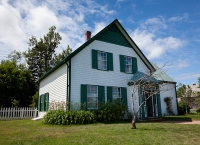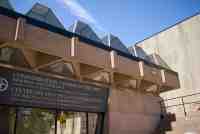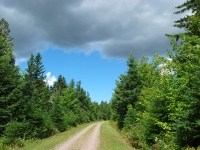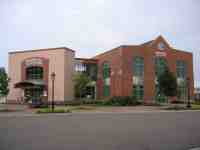City guides


Charlottetown Travel Guide
The capital of Prince Edward Island, Charlottetown is a small but bustling city and the site of the Charlottetown Conference, where Canadian statespeople met to first debate the Canadian Confederation. It's unsurprising that most of its most popular sights and attractions hark back to this historical epoch, with the majority of locals employed in the public sector.
Roundly celebrated for its clean air and sound urban planning policies, Charlottetown is easily navigable and picturesque. Victorian-era buildings dominate the scenic downtown area, while an ongoing waterfront redevelopment project seeks to convert industrial areas into parks and outdoor hiking trails.
The city's maritime position exerts a moderating influence on its climate, with temperatures never dropping as low, or climbing as high, as other Canadian cities of similar latitude. Its premier tourist drawcard is by far and away the Green Gables House, tucked away in the beautiful Prince Edward Island National Park, but there is plenty more to see and do for just about everyone in Charlottetown, a place bursting at the seams with entertainment and culture.
Things to do in Charlottetown
The main allure of Prince Edward Island for travellers is the fact that the little province inspired and formed the setting for the beloved Anne of Green Gables novels. But Green Gables House is actually situated in the Prince Edward National Park in Cavendish, making it more of an excursion for those on holiday in Charlottetown. The Confederation Centre for the Arts, within the city, also owes some of its popularity with visitors to L.M. Montgomery's novels, as a number of Anne-themed musicals and plays draw fans into the theatres of the complex. Other worthwhile tourist attractions in Charlottetown include St Dunstan's Basilica, a National Historic Site of Canada; Founder's Hall, which proudly traces the history of Prince Edward Island and the country as a whole; and the lovely Victoria Park. Charlottetown's appeal is its old-fashioned charm, perhaps epitomised by attractions like the 1950's-style Brackley Drive In Theatre.

Green Gables House
Nestled in the Prince Edward Island National Park is the charming and picturesque Green Gables House that, in the early 1900s, inspired author Lucy Maud Montgomery to write her celebrated novel Anne of Green Gables. Tourists flock here every year to ramble around the famous house, which served as a setting for the treasured tale, and to also enjoy the beautiful park that houses Green Gables. The house itself is filled with interesting displays, and also contains the charming Butter Churn Café and a visitors centre with restored rooms. There are trails to be explored (fans of the book will recognise Lovers Lane and the Haunted Wood), guided evening walks, children's activities, restored gardens and many other treasures to be enjoyed.

Confederation Centre for the Arts
Founded in 1964 as a National Memorial to the Fathers of the Confederation, the centre is a celebration of the diversity, talent and character of Canada and its history. Situated on the site of the old Charlottetown marketplace, it takes up a city block and is home to an art gallery, several theatres and a restaurant. A celebration of theatre and comedy, the annual Charlottetown Festival has spawned several highly successful productions, including the immensely popular Anne of Green Gables, Canada's longest running musical. The Confederation Centre Art Gallery has more than 15,000 pieces of contemporary, modern and historical Canadian art, and is well worth a visit.

Confederation Trail
The Confederation Trail stretches from tip to tip of Prince Edward Island, traversing through forests, wetlands, villages and waterways, for 173 miles (279km). Almost entirely flat with a finely crushed gravel surface, the trail is perfect for walkers, cyclists and even those in wheelchairs. Visitors enjoy the island's natural splendour, lush flora and abundant flora in peace and tranquillity.
In winter, the trail is a favourite with snowmobilers and provides a picturesque route through the province, from Tignish to Elmira. The less adventurous can choose to follow the trail for some of the way and stop off to rest and grab a bite in one of the many villages connected by the trail.

Founder's Hall
Founder's Hall is one of the more popular attractions on Prince Edward Island, located in a restored 1906 building on the Historic Charlottetown Waterfront. It incorporates history with state-of-the-art technology, allowing visitors to enjoy interactive exhibits, holovisuals and an absorbing 'Time Travel Tunnel' which traces the development of Canada and its provinces. The aim of Founder's Hall is to celebrate the spirit of cooperation shown by the Fathers of the Confederation, and to educate the public on the country's heritage. Far from the usual museum fare, it also contains a boutique shop selling island crafts, memorabilia and souvenirs.
Canada travel info
Electricity
Electrical current is 120 volts, 60Hz. American-style flat two-pin plugs and a plug with a third round grounding pin are standard.
Language
The official languages are English and French (spoken predominantly in Quebec).
Money
The currency used is the Canadian dollar (CAD). Banks and bureaux de change will change cash, as will some hotels. Major credit cards are widely accepted and ATMs are widespread. US dollars are widely accepted.
Tipping
A tip of around 15 percent is standard in restaurants, and hairdressers and taxi drivers are usually tipped at the same rate. Bellhops, doormen, porters, and similar service providers at hotels, airports, and stations are generally paid at the customer's discretion.
Health
Travellers should be up to date with your COVID-19 vaccines before traveling to Canada, and should consider taking routine vaccines as a standard precaution. Medical care is excellent but expensive, so medical insurance is advised.
Safety
While most visits to Canada are trouble-free, the country does share the common international risk of terrorism. The crime rate is low but travellers are advised to take sensible precautions to safeguard their belongings, as they would anywhere. Parts of Canada are prone to tornadoes between May and September.
Local customs
Rowdiness and loud speech are inappropriate except under special circumstances or in places such as bars, as Canadians tend to be soft spoken, patient and almost apologetic in their public behaviour. They are generally tolerant of the complex network of cultural differences in public behaviour, particularly in cities where such diversity is more common place. Recreational cannabis is legally available throughout Canada, though local laws can vary depending on the province or territory travellers are visiting.
Doing business
Vancouver, Toronto, Calgary, and Montreal are the main business centres, and English is the language of business except in French-speaking Quebec, where all written material and business cards should be in French. Business cards are not traditionally exchanged during an initial meeting, but at some appropriate time thereafter; it is best to wait for the host to offer theirs first.
A firm handshake is used by way of greeting and punctuality should be taken seriously for meetings. Canadians dress conservatively and smartly for business and suits are the norm. Gifts can be given in conclusion to celebrate a deal, but should be understated; taking someone out for a meal is a popular way to conclude business dealings.
Canadians are reserved and frown on emotional outbursts. Business is based on facts and figures rather than relationships, so it is best to be as prepared as possible for meetings. Hours of business are usually 9am to 5pm, Monday to Friday.
Duty free
Travellers to Canada are allowed to enter the country with the following items without incurring custom duties: gifts to the value of C$60 per recipient (excluding advertising material, tobacco and alcoholic beverages); 200 cigarettes, 50 cigars or cigarillos and 200g of tobacco or 200 tobacco sticks; 1.14 litres of liquor or wine or 24 x 355ml bottles or cans of beer or ale. There are strict regulations governing the import of the following: explosives, endangered animal and plant species, items of heritage, fresh foodstuffs and weapons.
Communications
The international access code for Canada is +1. The outgoing code is 011 followed by the relevant country code. The outgoing code is not necessary for calls to the US and the Caribbean. Hotels, cafes and restaurants offering free WiFi are widely available. As international roaming costs can be high, purchasing a local prepaid SIM card can be a cheaper option.
Passport & Visa
All visitors must hold a valid passport, and it's recommended that passports always be valid for six months after the intended period of travel. Visitors are required to hold onward or return tickets, all documents needed for the next destination and sufficient funds to cover the period of intended stay.
Travellers from most visa-exempt countries arriving in Canada by air need to fill in an Electronic Travel Authorisation (eTA) form online prior to visiting Canada. This requirement is applicable to all but U.S citizens and travellers with a valid Canadian visa. Canadian citizens, including dual citizens, and Canadian permanent residents cannot apply for an eTA. As part of the Western Hemisphere Travel Initiative (WHTI), all travellers travelling between the United States and Canada, Mexico, Bermuda, and the Caribbean region are required to present a passport or other valid travel documents to enter or re-enter the United States. If departing from the USA a valid passport will be required by immigration authorities.
Entry requirements
US travellers should have a valid passport if departing from the USA. Other proof of citizenship is accepted in the form of a birth certificate, a US certificate of citizenship, a US certificate of naturalisation, or a NEXUS card. A visa is not required for a stay of up to six months.
UK nationals must have a passport valid for the period of intended stay. A visa is not required for a stay of up to six months, though UK travellers must have Electronic Travel Authorisation (eTA).
Australians must hold passports valid for period of intended stay. Nationals of Australia with an Electronic Travel Authorisation (eTA) are visa exempt for a maximum stay of 6 months.
South African nationals must be in possession of a passport valid for the period of intended stay. A visa is required. South African temporary passports are not recognised. Passports, identity or travel documents of Bophuthatswana, Ciskei, Transkei and Venda are not accepted.
Irish nationals must hold a passport valid for the period of intended stay. A visa is not required for stays of up to six months. However, the individual must have an Electronic Travel Authorisation (eTA).
New Zealanders require a passport valid for the period of the intended stay. No visa is required for stays of up to 6 months. However, the traveller requires an Electronic Travel Authorisation (eTA).
Useful contacts
Canadian Tourism Commission, Vancouver: +1 604 638 8300 or www.travelcanada.ca
911 (all emergencies)Embassies / consulates in other countries
Canadian Embassy, Washington DC, United States: +1 202 682 1740.
Canadian High Commission, London, United Kingdom: +44 (0)20 7258 6600.
Canadian High Commission, Canberra, Australia: +61 (0)2 6270-4000.
Canadian High Commission, Pretoria, South Africa: +27 (0)12 422 3000.
Canadian Embassy, Dublin, Ireland: +353 (0)1 234 4000.
Canadian High Commission, Wellington, New Zealand: +64 (0)4 473 9577.
Embassies / consulates in Canada
United States Embassy, Ottawa: +1 613 688 5335.
British High Commission, Ottawa: +1 613 237 1530.
Australian High Commission, Ottawa: +1 613 236 0841.
South African High Commission, Ottawa: +1 613 744 0330.
Irish Embassy, Ottawa: +1 613 233 6281.
New Zealand High Commission, Ottawa: +1 613 238 5991.


